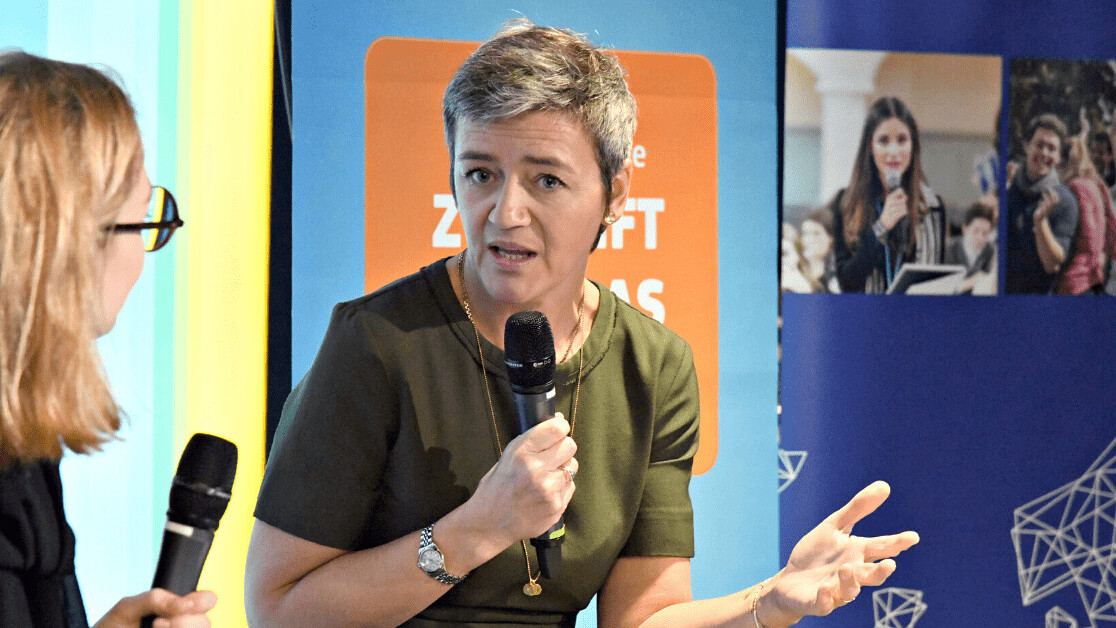Just yesterday, Europe’s top competition authority said it would be scrutinizing smaller acquisitions made in the continent by foreign tech giants. The comments, made by Margrethe Vestager, the European Union’s (EU) chief competition officer, come amid an alleged “shopping spree” carried out by American behemoths.
Although this appears to be meant to protect the European tech ecosystem, what will the actual effect be on startups and investors in the continent?
[Read: Pizza, beer, and ping-pong — why your image of early-stage startups is wrong]
Europe has indeed seen its fair share of acquisitions by tech giants in recent years. In 2011, for example, US tech giant Microsoft paid $8.5 billion for Skype. While such deals make headlines for obvious reasons, it’s reasonable for regulators to consider keeping a closer eye on transactions that aren’t typically subjected to the same level of scrutiny.
“What we will try to do is to find ways to make sure that we see these acquisitions because sometimes these businesses are quite small, and maybe the sums, the turnover will not meet our thresholds,” Vestager told CNBC.
So, what’s currently happening to those smaller deals that often go under the radar.
EU should focus on why
Jonathan Simnett, director at specialist technology M&A advisory firm Hampleton Partners told GQ that most disclosed transactions in the European technology markets over the past 30 months involved European companies buying other European players.
“To put this into context, only 25% of the global transactions in the past 30 months have involved the acquisition of European companies versus 68% being North American. So, the term ‘shopping spree’ could be considered alarmist even if the transaction for the smallest firms may not be disclosed,” he added.
Increased regulatory scrutiny may be useful to ensure the market stays competitive for consumers, but Simnett believes the focus needs to be adjusted to ensure the ecosystem offers the same opportunities for companies without them having to relocate elsewhere.
“What should concern the EU more is that one of the major reasons European companies are bought — whatever the nationality of their buyer — is that they are unable to achieve scale at the rate of those in North America, and increasingly, in Asia, and particularly China,” he continued.
A signal of a healthy ecosystem
Simon Menashy, a partner at venture capital firm MMC Ventures, said the EU‘s proposals were “well-meaning” but noted that acquisitions — regardless of size — were part of the ecosystem’s lifeblood.
“Threatening that cycle, whether actually blocking acquisitions or just introducing delay and friction, may undermine investors‘ confidence that they will one day be able to sell their stake for a profit — key to taking that early-stage risk in the first place,” he told me.
“We have been here before,” he added. “Venture funding in France took a dive in 2014 after the government blocked Yahoo‘s acquisition of Dailymotion because it ‘had to remain French.’ This time around the ecosystem is much larger and the stakes are higher. And with a tit-for-tat attitude in the US administration, let’s not provoke retaliation against our own emerging tech successes as they set out to conquer America.”
Andy Moseby, a corporate partner at Kemp Little, a law firm specializing in technology and digital media, agreed. He did, however, acknowledge that there needs to be a balance between protecting consumers from monopolistic practices and discouraging US tech investment in the EU.
“Without a buoyant M&A market, there is little incentive for European entrepreneurs to create world-class businesses in their home states when they could just move to the US West Coast,” he added.
Finding the balance
Ed Macnair, the CEO of cybersecurity company Censornet, said the rate of acquisition in Europe was evidence of a thriving ecosystem of innovation and technology.
“The reality is that we want UK and European companies to succeed internationally and most founders and CEOs have global ambitions. One of the paths to global growth is through acquisition and it builds confidence to see that European companies are attracting international buyers, which helps to bring European tech into new markets,” he added.
There’s no denying that the EU has a hard task at hand: Regulating the industry while also giving tech companies in the continent the best chance to succeed.
Unveiled today, the EU’s first draft digital strategy is likely to have major consequences for tech behemoths such as Facebook, Apple, and Google — it’s also a signal that Vestager and her team aim to cement the EU’s global role in regulation.
The EU‘s challenge will be to do what others have struggled to do before: find the balance between regulation and innovation. If they manage to do this, while preserving a fair and competitive market, it’s likely that startups and scaleups will benefit. The ball is in Vestager’s court.
Like what you’ve read? On Growth Quarters, we strive to go beyond generic ‘fortune cookie advice’ and learn directly from people who have walked the walk. And this summer, at TNW Conference 2020 in Amsterdam, we’ll take Growth Quarters offline with a vibrant program dedicated to sustainable business growth. Hear from those leading the world’s most successful companies and get actionable insights to help you grow professionally. Get early bird tickets now and learn more about the Growth Quarters track.
Get the TNW newsletter
Get the most important tech news in your inbox each week.





